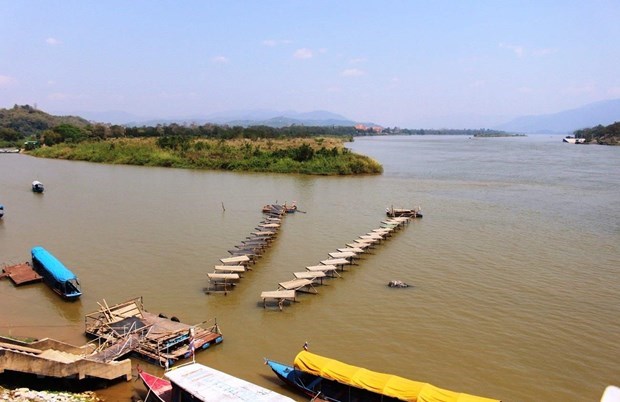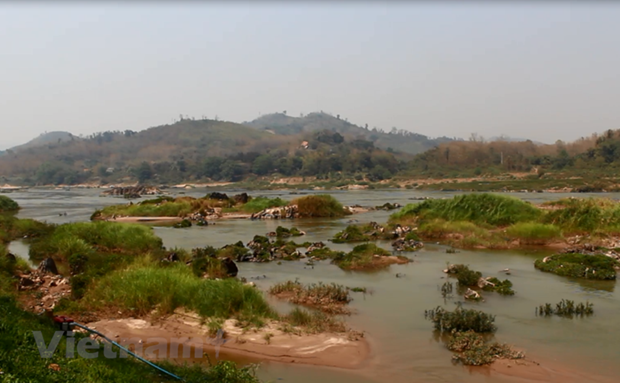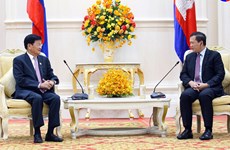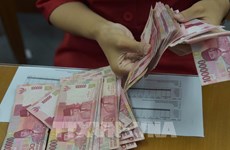Lower Mekong Initiative: A decade to improve human resources
 Mekong River in the Golden Triangle region of Thailand, Laos and Myanmar. (Photo: VietnamPlus)
Mekong River in the Golden Triangle region of Thailand, Laos and Myanmar. (Photo: VietnamPlus)
Hanoi (VNA) – Over the past 10 years, US agencies have provided more than 3.5 billion USD to support countries in the Mekong region as part of the Lower Mekong Initiative (LMI), a decade-long partnership between the US, Cambodia, Laos, Myanmar, Thailand, and Vietnam to advance sustainable economic growth in the region.
According to the US Department of State, 340,000 people have got access to improved drinking water while 3,800 managers, teachers, and students have been trained in technical English, and 27,000 people have access to improved sanitation under the Lower Mekong Initiative programmes.
Over the past decade, the Lower Mekong Initiative has also helped countries in the Mekong region to better cope with cross-border challenges related to water security and smart hydropower.
Addressing the 12th Lower Mekong Initiative Ministerial Meeting in Bangkok, Thailand, on August 1, US Secretary of State Michael R. Pompeo said these are real achievements that showed the US’s commitments to a partnership with the five Mekong countries.
He affirmed that the US will continue helping the five Mekong countries protect their sovereignty and security, boost economic development and safeguard rich cultures and environment.
Pompeo mentioned some troubling trends, including a spree of upstream dam building which concentrates control over downstream flows. The river has been at its lowest levels in a decade – a problem linked to China’s decision to shut off water upstream, he added.
In addition, criminal groups – some active in casinos and special economic zones – are using the Mekong as their major artery to traffic drugs, wildlife, and even human beings, he said.
To confront these challenges and others, the secretary suggested sustaining partnerships, building new ones, and keeping an eye on the future.
 Low water level at the Mekong River (Photo: VietnamPlus)
Low water level at the Mekong River (Photo: VietnamPlus)One of the solutions to deal with these challenges is the Japan-US Mekong Power Partnership, or JUMP, which will develop regional electricity grids with an initial US commitment of 29.5 million USD.
The US also plans to provide an initial 14 million USD in assistance to the Mekong countries to counter transnational crime and trafficking, Pompeo said, adding that this initiative will provide support for law enforcement and victims of trafficking in persons in addition to stopping financial flows for wildlife traffickers, and help counter the expansion of methamphetamine flows and other illegal activity coming from the Golden Triangle.
Turning to other areas, later this year the US will hold an Indo-Pacific conference on strengthening governance of trans-boundary rivers. This gathering will bolster support for a transparent, rules-based approach to the Mekong, he revealed.
Looking ahead to 2020, the US sees Vietnam’s chairmanship of the Association of Southeast Asian Nations (ASEAN) as an excellent chance for continuity in making further progress on the Mekong cooperation, including by making the annual ministerial meeting more focused, strategic, and effective, he added.
According to the US Agency for International Development (USAID), the Lower Mekong Initiative is supported through two inter-disciplinary pillars: the Nexus Pillar (covering environment, water, energy and food), and the Human Development and Connectivity Pillar (covering STEM education, health, women’s empowerment, and economic integration).
Through the US’ long history of engagement with the countries of Southeast Asia, there is an increasing awareness of the growing number of issues that cross national boundaries. The countries of the Lower Mekong sub-region share a variety of common concerns, including trans-boundary water resources management, infectious diseases such as dengue and pandemic influenza, and vulnerability to the negative effects of climate change. The Lower Mekong Initiative seeks to support a common regional understanding of these issues and to facilitate effective, coordinated responses.
USAID supports the Lower Mekong Initiative through the Connecting the Mekong through Education and Training programme, a signature investment in workforce development under the initiative./.












